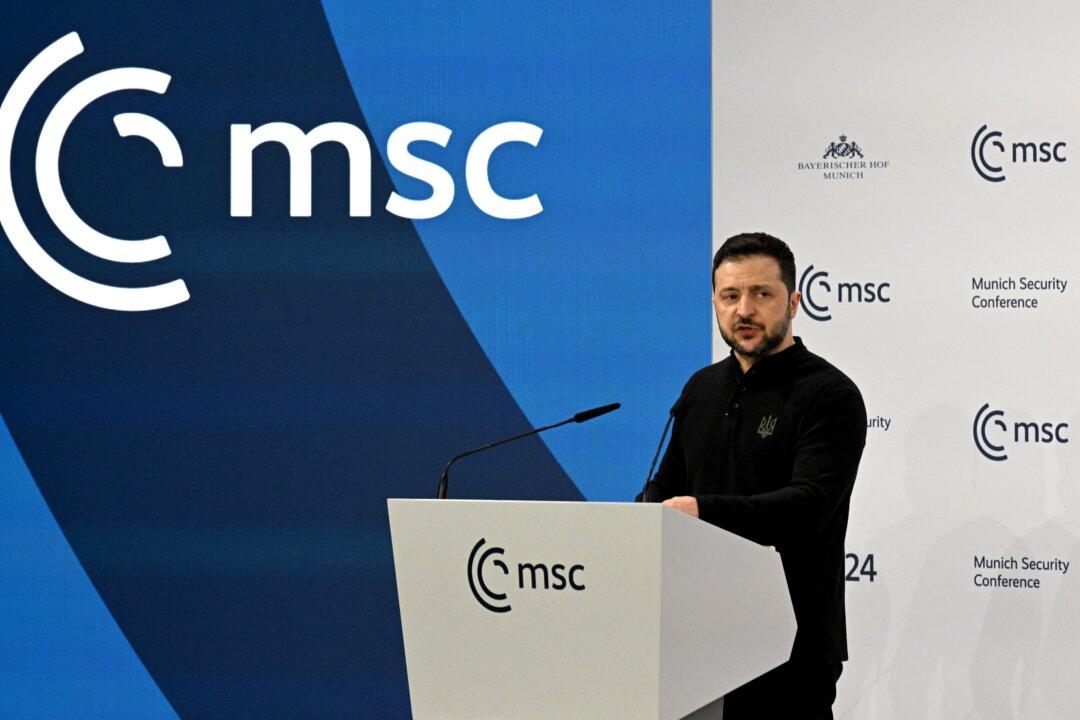The United States would lose a war against China over the future of Taiwan unless it shifts its defense priorities away from Europe, according to one senior Republican.
Sen. Josh Hawley (R-Mo.) said the United States had overextended itself with its support for Ukraine’s defense against the Russian invasion, and that it would not be able to deter China without first pulling back from Ukraine.
“China is on the march and we are not at this moment prepared to stop them,” Hawley said during a Feb. 16 talk with the Heritage Foundation, a conservative think tank.
“If China were to invade Taiwan today, they would prevail.”
Hawley blamed the current U.S. dedication to providing arms and other aid to Ukraine on what he deemed to be a wish for “liberal empire” by neoconservatives and globalists.
He said the ambition of promoting democracy and liberal values throughout the world was not sustainable and U.S. military power was a finite resource drained by the effort.
“The core problem is our actions in Ukraine are directly affecting our ability to deter our most pressing adversary in the Pacific,” said Hawley.
‘A Dark Future’
Hawley warned that the Chinese Communist Party (CCP), which rules China as a single-party state, had been plotting a Taiwan takeover for a long time. CCP leader Xi Jinping, he noted, has frequently made claims swearing to follow through on that ambition.“Invading Taiwan has been Xi’s goal for years,” Hawley said.
“My worry is if we do not change course we may not be able to do anything about it.”
The CCP falsely claims that Taiwan is a breakaway province of China that must be united with the mainland. Taiwan has never been controlled by the CCP, however, and its democratic government is a continuation of that which the CCP sought to overthrow during the Chinese Civil War.
For its part, the United States formally recognizes, but does not endorse, the CCP’s position, and maintains legal obligations to provide Taiwan with weapons for its self-defense.
Taiwan is also a major trade partner of the United States, and manufactures the vast majority of its advanced semiconductor chips, which are used in everything from modern pickup trucks to hypersonic missiles.
The United States and the world share an economic reliance on both Taiwan and China, Hawley said, and a Chinese communist invasion of the island would be catastrophic, possibly laying the groundwork for the erosion of the United States itself.
“By some estimates, war over Taiwan would send us into a deep recession with no clear way out,” Hawley said.
Likewise, Hawley said, by breaking through the First Island Chain spanning Japan to Indonesia, China would be able to secure its military presence throughout the world and spread its campaign of coercion, intimidation, and domination.
“Imagine a world where Chinese warships could patrol Hawaii’s waters,” Hawley said, “and Chinese submarines could stalk the California coastline. Imagine a world where the People’s Liberation Army has military bases in central and South America. Imagine a world where Chinese forces operate freely in the Gulf of Mexico and the Atlantic Ocean.”
New Foreign Policy Strategy Needed
Hawley said the United States would need to pursue a nationalist foreign policy to prevent that dark future from coming to pass, a policy which approached the geopolitical situation with “clear-eyed realism” and recognized that deterring China’s invasion of Taiwan should be America’s “top foreign policy priority.”As such, he said, the nation’s defense spending and posture should be oriented to the Pacific, not Europe, and the United States would need to scale back or even end its commitment to Ukraine.
“Strengthening deterrence in the Indo-Pacific means scaling back our military commitments in Europe,” Hawley said.
This would not mean abandoning the NATO alliance, he added. Rather, Hawley argued that the United States and its NATO allies would need to come up with a more equitable burden sharing arrangement, in which European powers took first priority in responding to threats in Europe and the United States did so to threats in the Indo-Pacific.
“The current policy of the United States pretending it can do everything for the Europeans in Europe and it can do everything [in] the rest of the world [and] in Asia is simply fanciful and it cannot be sustained,” Hawley said.
“Europe is important to us, but it is not the key, and it is time we told our NATO allies that bluntly.”
Ultimately, Hawley said, the repositioning of American defense priorities from Europe to the Indo-Pacific was paramount to preventing a catastrophic conflict between the United States and China.
Only by conserving the resources being expended in Ukraine and elsewhere, he said, could that deterrence be assured.
“If we do not stop China in Asia, nothing else we do against China anywhere else will matter very much,” Hawley said.
“This country is the strongest country on the face of the earth… We will prevail. But we must make the choices now to make sure that possibility becomes a reality.”





